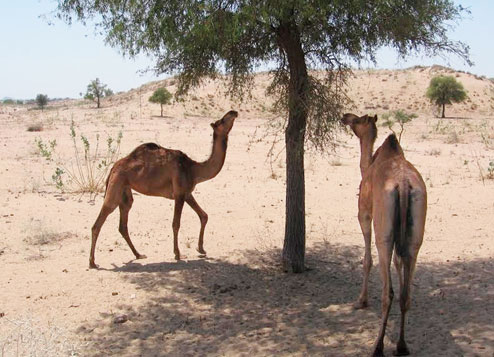 |
| Freedom at last |
Jaipur, Oct. 5: Come Monday, a 150-year-old tradition will die but a tall and tough workaholic will live.
The descendants of the nawabs of Tonk, 97km from Jaipur, have decided to stop the practice of sacrificing a camel from this Id following a law the Rajasthan government amended earlier this year declaring the “ship of the desert” a state animal.
Asmat Ali, one of the descendants of the nawabs, said both Muslims and non-Muslims met the district collector and decided to do away with the practice, “respecting” the state government’s declaration.
“There is no religious sentiment attached to the ritual of sacrifice. And I always condemned this slaughter,” Ali told The Telegraph.
Tonk, on the banks of the Banas river, has been ruled by seven nawabs and was the capital of the eponymous princely state from 1817 to 1947. It is known as the Nawabi Nagri and also as “Rajasthan ka Lucknow” because of its once sizeable Muslim population.
Now, only 3,000-4,000 Muslims remain in Tonk — the others have migrated in search of greener pastures.
According to local lore, the fourth nawab, Ibrahim Ali Khan, had dreamt that a camel should be sacrificed and its meat distributed among the poor on Id. From 1864, two camels used to be slaughtered till 1990, one at the Idgah and other at Mubarak Mahal, the family haveli of the nawabs.
After 1990, only one camel was slaughtered — at the mansion — as the atmosphere had by then become charged over the Ayodhya dispute.
On June 30 this year, the BJP-led state government amended the Rajasthan Bovine Animal (Prohibition of Slaughter and Regulation of Temporary Migration or Exports of Camel) Act, 1995, declaring the camel as one of the two state animals, the other being the chinkara.
A draft bill has also proposed punishments, including jail terms between three and seven years, for slaughtering and smuggling camels, although the penal provisions are yet to come into force.
“Before the proposed new law, which has prescribed imprisonment for slaughtering and smuggling, at least 200-300 camels were being illegally smuggled to other states and countries daily from Rajasthan,” said Hanwant Singh Rathore, director of the League of Pastoral People, an organisation involved in protecting camels and other livestock.
Animal rights activists, who were among those behind the state government’s June 2014 amendment, said the uncomplaining ship of the desert had been in rough waters.
According to official figures, the number of camels in the state had fallen from 7.63 lakh in 1995 to 2.24 lakh in 2013, although Rathore said the actual camel population might be even fewer than that.
Sources said camels — slaughtered for their meat and skin — were also being killed as part of sacrificial offerings and illegally transported to other states for slaughter. While the meat is sent to the Gulf countries and Bangladesh, the skin is used in leather products.
Another reason that contributed to the depleting population was the gradual disappearance of grazing grounds. It meant that traditional camel breeders like the Raikas and Rebaris, who once never sold camels, were forced to do so as rearing the animals was proving economically draining, said Rathore.
Also, with the development of modern transport, camels were no longer indispensable as indefatigable carriers.
While the proposed punishments can help save the hump-backed working animals, the breeders now want to sell off their stock as fast as possible before the new law with the penal provisions kicks in.
Rathore had a suggestion. “The state government,” he said, “needs to intervene at this juncture and work upon encouraging camel by-products like wool and milk; paper from camel dung and carpets from their hair.”










